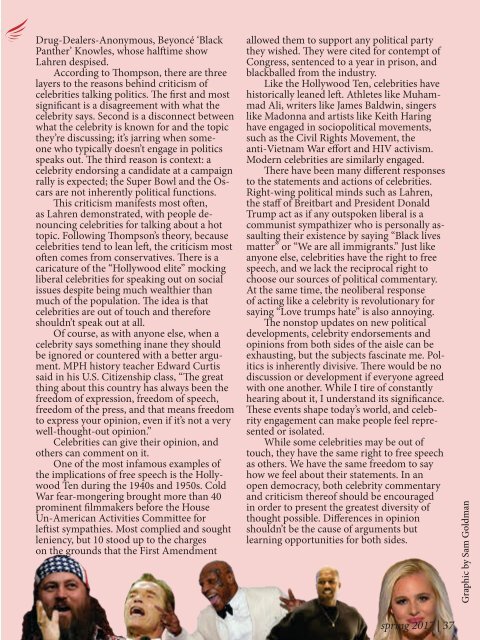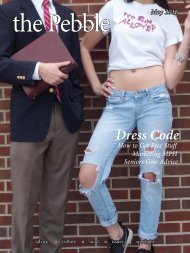the Pebble Spring 2017
Create successful ePaper yourself
Turn your PDF publications into a flip-book with our unique Google optimized e-Paper software.
Drug-Dealers-Anonymous, Beyoncé ‘Black<br />
Pan<strong>the</strong>r’ Knowles, whose halftime show<br />
Lahren despised.<br />
According to Thompson, <strong>the</strong>re are three<br />
layers to <strong>the</strong> reasons behind criticism of<br />
celebrities talking politics. The first and most<br />
significant is a disagreement with what <strong>the</strong><br />
celebrity says. Second is a disconnect between<br />
what <strong>the</strong> celebrity is known for and <strong>the</strong> topic<br />
<strong>the</strong>y’re discussing; it’s jarring when someone<br />
who typically doesn’t engage in politics<br />
speaks out. The third reason is context: a<br />
celebrity endorsing a candidate at a campaign<br />
rally is expected; <strong>the</strong> Super Bowl and <strong>the</strong> Oscars<br />
are not inherently political functions.<br />
This criticism manifests most often,<br />
as Lahren demonstrated, with people denouncing<br />
celebrities for talking about a hot<br />
topic. Following Thompson’s <strong>the</strong>ory, because<br />
celebrities tend to lean left, <strong>the</strong> criticism most<br />
often comes from conservatives. There is a<br />
caricature of <strong>the</strong> “Hollywood elite” mocking<br />
liberal celebrities for speaking out on social<br />
issues despite being much wealthier than<br />
much of <strong>the</strong> population. The idea is that<br />
celebrities are out of touch and <strong>the</strong>refore<br />
shouldn’t speak out at all.<br />
Of course, as with anyone else, when a<br />
celebrity says something inane <strong>the</strong>y should<br />
be ignored or countered with a better argument.<br />
MPH history teacher Edward Curtis<br />
said in his U.S. Citizenship class, “The great<br />
thing about this country has always been <strong>the</strong><br />
freedom of expression, freedom of speech,<br />
freedom of <strong>the</strong> press, and that means freedom<br />
to express your opinion, even if it’s not a very<br />
well-thought-out opinion.”<br />
Celebrities can give <strong>the</strong>ir opinion, and<br />
o<strong>the</strong>rs can comment on it.<br />
One of <strong>the</strong> most infamous examples of<br />
<strong>the</strong> implications of free speech is <strong>the</strong> Hollywood<br />
Ten during <strong>the</strong> 1940s and 1950s. Cold<br />
War fear-mongering brought more than 40<br />
prominent filmmakers before <strong>the</strong> House<br />
Un-American Activities Committee for<br />
leftist sympathies. Most complied and sought<br />
leniency, but 10 stood up to <strong>the</strong> charges<br />
on <strong>the</strong> grounds that <strong>the</strong> First Amendment<br />
allowed <strong>the</strong>m to support any political party<br />
<strong>the</strong>y wished. They were cited for contempt of<br />
Congress, sentenced to a year in prison, and<br />
blackballed from <strong>the</strong> industry.<br />
Like <strong>the</strong> Hollywood Ten, celebrities have<br />
historically leaned left. Athletes like Muhammad<br />
Ali, writers like James Baldwin, singers<br />
like Madonna and artists like Keith Haring<br />
have engaged in sociopolitical movements,<br />
such as <strong>the</strong> Civil Rights Movement, <strong>the</strong><br />
anti-Vietnam War effort and HIV activism.<br />
Modern celebrities are similarly engaged.<br />
There have been many different responses<br />
to <strong>the</strong> statements and actions of celebrities.<br />
Right-wing political minds such as Lahren,<br />
<strong>the</strong> staff of Breitbart and President Donald<br />
Trump act as if any outspoken liberal is a<br />
communist sympathizer who is personally assaulting<br />
<strong>the</strong>ir existence by saying “Black lives<br />
matter” or “We are all immigrants.” Just like<br />
anyone else, celebrities have <strong>the</strong> right to free<br />
speech, and we lack <strong>the</strong> reciprocal right to<br />
choose our sources of political commentary.<br />
At <strong>the</strong> same time, <strong>the</strong> neoliberal response<br />
of acting like a celebrity is revolutionary for<br />
saying “Love trumps hate” is also annoying.<br />
The nonstop updates on new political<br />
developments, celebrity endorsements and<br />
opinions from both sides of <strong>the</strong> aisle can be<br />
exhausting, but <strong>the</strong> subjects fascinate me. Politics<br />
is inherently divisive. There would be no<br />
discussion or development if everyone agreed<br />
with one ano<strong>the</strong>r. While I tire of constantly<br />
hearing about it, I understand its significance.<br />
These events shape today’s world, and celebrity<br />
engagement can make people feel represented<br />
or isolated.<br />
While some celebrities may be out of<br />
touch, <strong>the</strong>y have <strong>the</strong> same right to free speech<br />
as o<strong>the</strong>rs. We have <strong>the</strong> same freedom to say<br />
how we feel about <strong>the</strong>ir statements. In an<br />
open democracy, both celebrity commentary<br />
and criticism <strong>the</strong>reof should be encouraged<br />
in order to present <strong>the</strong> greatest diversity of<br />
thought possible. Differences in opinion<br />
shouldn’t be <strong>the</strong> cause of arguments but<br />
learning opportunities for both sides.<br />
Graphic by Sam Goldman<br />
spring <strong>2017</strong> | 37



